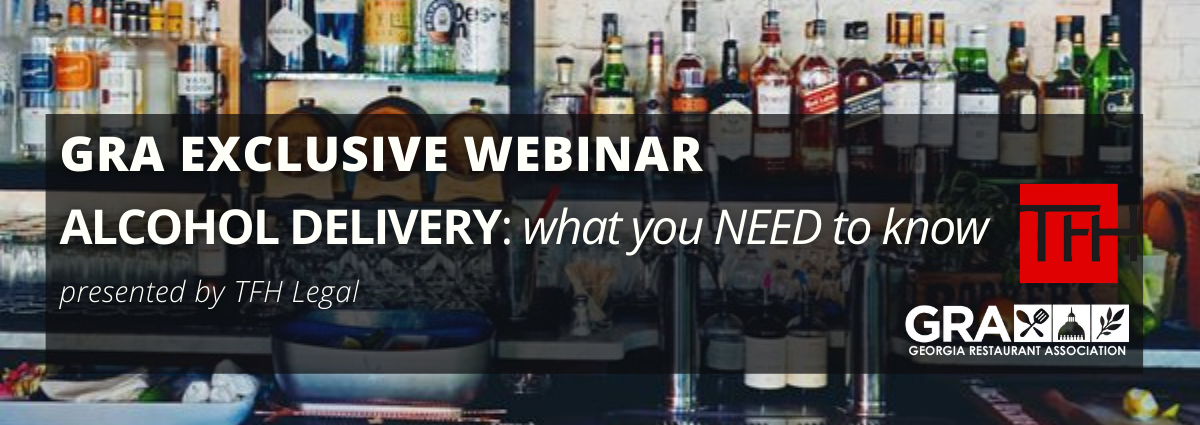Alcohol Delivery In Georgia: What You Need To Know

To-go beer and wine have been some of the staple items that allowed restaurants to make a profit during the pandemic. Now, thanks to a new law that passed earlier this year (HB 879), Georgia restaurant owners will now have the opportunity to permanently capitalize on takeout and delivery alcohol sales. On Friday December 11, 2020, the Georgia Restaurant Association welcomed GRA Platinum Preferred Partner, TFH Legal to break it down for us and provide the basic guidelines and liability considerations. Here's a detailed recap of the webinar -
HB 879 passed in July 2020, became effective on August 3, 2020 (Codified as OCGA3-3-10)
- Allowing Licensed alcohol retailers:
- Grocery stores
- Gas stations
- Convenience stores
- Package stores
- Restaurants*
- Brewpubs*
- Bars*
- Other consumption-on-premises retailers*
- No need to obtain additional licenses/permits from the Revenue Department if eligible
- Not all jurisdictions allow consumption-on-premises licenses concurrently with package beer and wine licenses
- Packages must be unbroken (the format the package came from the wholesaler)
- *Must have local licenses
Which licensees are prohibited from alcohol delivery?
- Licensed alcohol manufacturers
- Breweries
- Wineries
- Distilleries
- Brewpubs operate on the retail tier and are eligible
Who can deliver the alcohol?
- An employee of the alcohol retail licensee
- A third -party service employee
What are the requirements for someone to be eligible to deliver alcohol?
- 21 years or older with valid Georgia driver’s license
- Criminal background check (with written consent of employee)
- Must complete mandatory delivery training course approved by DOR
- Keep copies of these certifications in the delivery vehicle at all times or stored in an accessible format electronically
- As of right now, delivery drivers do not need additional permits (12/11/2020)
Where can the alcohol be delivered?
- Delivery may only be completed where the license was granted under local jurisdiction
- Deliveries may not leave the boundaries of the local licensing jurisdiction
- For example, an establishment licensed in the city of Atlanta can deliver anywhere in that jurisdiction, but an establishment licensed in unincorporated Fulton County may not deliver to the City of Atlanta
- Can only deliver to consumers, not other licensees
- Also, no deliveries to:
- Schools, dormitories, prisons, reformatories, other correctional facilities, mailboxes, package shipping locations or storage facility businesses.
What can be delivered?
- Restaurants can only deliver:
- Beer
- Wine
- Unbroken packages, meaning a bottle of wine or can of beer can only be delivered in the state it was received by the restaurant (unopened)
When can alcohol be delivered?
- Any time that the sale of package beer and wine is permitted by the licensee’s local jurisdiction
- All deliveries must be completed on the same day of the sale and the same day the alcoholic beverages leave the licensed premises of the retailer
- Example: An order cannot be entered at 11:50 P.M. and fulfilled after 12:00 A.M.
Additional conditions
- Alcoholic beverages must be delivered to a person at the address specified in the order and cannot be left curbside
- Alcoholic beverages may only be delivered to a person who:
- Is 21 or older
- Presents proper ID verifying age
- Provides a signature that matches the identification
- The person cannot be noticeably intoxicated
- Delivery drivers should not receive direct compensation (tips) for delivery of alcohol
- Delivery drivers must allow the purchaser to inspect the delivered alcoholic beverages at the time of delivery. All sales of alcoholic beverages are final
- Third-party service cannot upcharge alcoholic beverages
- The licensee must appear as the merchant of record at all times, including at the time of purchase and at the time of receipt of the delivery
- Example: bank statement must say the licensee’s name and not DoorDash, UberEats, Post Mates, etc.
- All payments for the sale and delivery of alcoholic beverage must be processed prior to the alcoholic beverages leaving the premises
record keeping requirements
- Criminal background investigation report
- List of employees and contractual agreements of third-party services delivering alcoholic beverages
- Employees’ training course certifications
- A record of the delivery recipient’s name and date of birth for 3 years
Three primary types of liability for Alcohol Delivery
- Regulatory liability
- If something goes wrong in the delivery, the licensee will ultimately be the one who answers to the Department of Revenue
- Third-Party liability
- Is the Third-Party service considered an independent contractor or an Agent of the restaurateur?
- An independent contractor designation does not necessarily protect the restaurant from liability for the third-party delivery service
- Designation as an Agent does not necessarily impose civil liability on the restaurant
- If the driver is making a delivery and causes an accident working for a third-party service, is the restaurant liable?
- If the driver delivers alcohol to an obviously inebriated individual who later drives and causes an accident, is the restaurant liable?
- Employer liability
- Are you liable for the acts of your own employees?
- Yes, if the employee is acting within the boundaries of his or her employment EVEN though the employee is not authorized or forbidden to perform the particular act
- No, generally where the employee’s conduct is entirely disconnected from the employer’s business and wholly personal to the employee (like driving somewhere on a lunch break)
Suggestions to best protect yourself from alcohol delivery liability
- Much yet to be determined
- Check your liquor liability policy. Don’t assume that your policy will automatically cover alcohol delivery
- Consider a non-owned automobile policy
- Double check your commercial general liability policy
- Review your contracts with Third Party delivery service providers
- Consider requiring an indemnity clause; requiring that the company complies with Georgia law for alcohol delivery
- New policies and procedures for your employee handbook regarding rules for driving while on business, including rules for delivery of alcohol
- Add background checks and more vehicle record checks to your pre-employment process and consider initiating periodic checks to anyone who may be driving
- Include anti-discrimination, sexual harassment and similar policies as well as use of alcohol and substance abuse policies in your employee handbook
If you missed today's webinar or would like to listen again - on-demand recording.
*GRA Disclaimer* While the information provided today is meant to help you gain a better understanding as it relates to your restaurant reopening, we strongly encourage and recommend you to also consult with your trusted legal and financial advisors before making any decisions.
TFH is a full-service Atlanta-based law firm that provides a wide range of commercial legal services. The attorneys at TFH have over 100 years of combined experience in the hospitality industry, specializing in beverage-alcohol, labor & employment, commercial leasing, business contracts, along with business partner & shareholder issues.
ABOUT THE SPEAKERS

D. Taylor Harper, shareholder at TFH Legal; Taylor’s practice focuses primarily on regulatory compliance and litigation in the food and beverage industry with an emphasis on beverage alcohol and cannabis sectors at the federal, state, and local levels.
Lisa F. Harper, shareholder at TFH Legal; Lisa’s legal expertise and general common sense and good judgment serve her well in a variety of legal and practical areas. Due to her client needs and the nature of the areas of law in which she focuses, Lisa's practice in most of these areas has both litigation (as well as litigation prevention) and transactional aspects.

